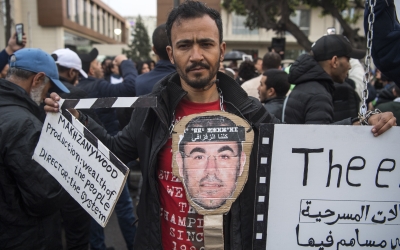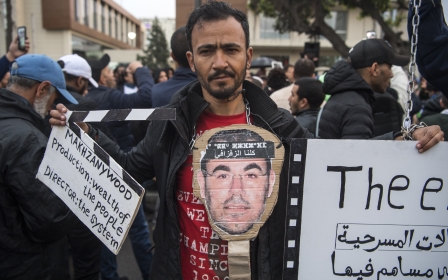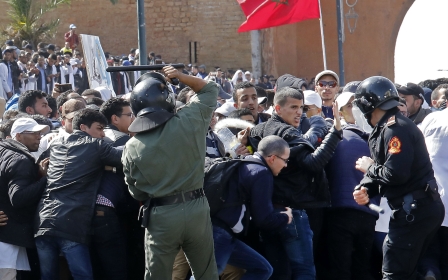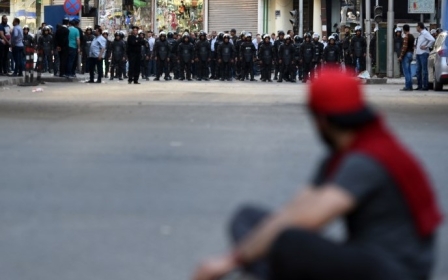Thousands of Moroccans demonstrate in support of imprisoned activists

Thousands of Moroccans staged a march on Sunday in downtown Rabat to demand the release of activists who led protests over economic and social problems in the northern Rif region in late 2016 and 2017.
Two weeks ago, an appeals court in Casablanca upheld 20-year prison sentences against Nasser Zefzafi, Nabil Ahamjik, Ouassim Boustati and Samir Ighid on charges including undermining public order and threatening national unity, Reuters said.
Another 35 activists were jailed for between two and 15 years and one received a one-year suspended sentence. Authorities accused the activists of having separatist aims.
"The people want the release of the detainees," demonstrators shouted as they marched behind a banner supporting activists linked to the Al-Hirak al-Shaabi, or "Popular Movement" movement, according to AFP.
New MEE newsletter: Jerusalem Dispatch
Sign up to get the latest insights and analysis on Israel-Palestine, alongside Turkey Unpacked and other MEE newsletters
In 2016, the protests in the predominantly Amazigh-speaking Rif erupted after the death of fishmonger Mouhcine Fikri, who was crushed inside a rubbish truck trying to recover fish confiscated by police.
Social unrest in the region was sparked by the death of Fikri and escalated into a wave of protests against corruption and unemployment and demanding more development.
Sunday’s rally, dubbed the "March of the Moroccan people: Stop political injustice", was organised by detainees' families along with political and rights groups.
AFP reporters saw thousands of people in the streets, some clutching photographs of those serving jail terms ranging from one to 20 years.
"We call for an end to political arrests and for the release of all detainees linked to social movements and a response to their legitimate demands," said activist Boubaker al-Jawhari.
The sentences, first handed down last June, were upheld 6 April by the Casablanca court of appeal, sparking criticism from rights groups.
Zefzafi, 39, emerged as the face of the movement as a result of his rallying speeches, accusing the authorities of corruption.
Amnesty International has said the activist was held in solitary confinement and subjected to "conditions tantamount to torture".
He boycotted the appeal proceedings along with 37 other defendants, after denouncing the first case as a "political trial".
In response to criticism, the Moroccan authorities have insisted the judicial process has followed international standards.
Prison authorities say the activists were moved on 11 April from Casablanca to a facility in northern Morocco to be "close to their families".
"They were transferred to the worst prisons in the kingdom" and "started a hunger strike," said Ahmed Zefzafi, father of Nasser.
Way out of crisis
Addressing a news conference after the Sunday demonstration, he called on "decision-makers to find a way out of this crisis".
Prison authorities said on Friday that the detainees' health was being closely monitored.
Other family members confirmed that their detained relatives are protesting against the conditions they are being held in.
Eleven others were pardoned last year by King Mohammed VI.
The Rif demonstrations, along with those in the mining town of Jerada in early 2018, have been the most intense since unrest in 2011 prompted the king to devolve some of his powers to an elected parliament.
Middle East Eye delivers independent and unrivalled coverage and analysis of the Middle East, North Africa and beyond. To learn more about republishing this content and the associated fees, please fill out this form. More about MEE can be found here.





